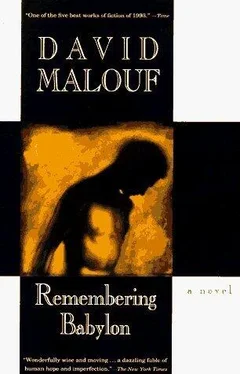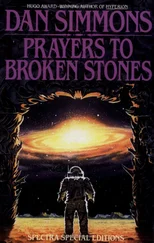It pleased her to let her mind drift so far, then further — out over the muddy, stinking flats towards the waters of the bay, which were not visible yet, but approaching.
Her mind, even as it entered the ravaged yards, the shacks, the heads of sleeping children who were forbidden for the time being to visit but would come back when all this nonsense was over, the jaws of silkworms softly spinning, was at the same time stilled, dreamily attendant, beyond tinted glass, to the life of the hive, moving closer now to the spirit of it, to the language they were using, those angelic creatures in their world of pure geometry, of circles, half-circles, hexagons, figures-of-eight.
When she glances up again, for she has been dozing, the misty blue out there has become indigo; the first lights have been doused, though the houses themselves do not fade from her mind, or the children who are sleeping in them. The first bright line of moonlight has appeared out on the mudflats, marking the ever moving, ever approaching, ever receding shore. All this a kind of praying. It does not make a house any less vivid out there because she can no longer see its light; or the children any less close because they no longer come to visit; or Willie because she has never known him except for what she has felt in Lachlan, and through him, in herself, the wedge of apple in his mouth; or her mother, long gone, standing out on the hillslope in the dark, the dark of her body solid through the flimsy stuff, the moonlight, of her shift; or her father slumped at the breakfast table, the loose skin of her mother’s hand, like an old glove, on the leathery back of his neck; or in darkness now, on the other side of the house, the single mind of the hive, closed on itself, on its secret, which her own mind approaches and draws back from, the moment of illumination when she will again be filled with it; and Mrs Hutchence who has led her to this; and always, in a stilled moment that has lasted for years, Gemmy as she saw him, once and for all, up there on the stripped and shiny rail, never to fall, and Flash slicing the air with his yelps in clear dog-language, and his arms flung out, never to lift him clear; overbalancing now, drawn by the power, all unconscious in them, of their gaze, their need to draw him into their lives — love, again love — overbalanced but not yet falling. All these, Lord, all these. Let none be left in the dark or out of mind, on this night, now, in this corner of the world or any other, at this hour, in the middle of this war …
Out beyond the flatlands the line of light pulses and swells. The sea, in sight now, ruffles, accelerates. Quickly now it is rising towards us, it approaches.
As we approach prayer. As we approach knowledge. As we approach one another.
It glows in fullness till the tide is high and the light almost, but not quite, unbearable, as the moon plucks at our world and all the waters of the earth ache towards it, and the light, running in fast now, reaches the edges of the shore, just so far in its order, and all the muddy margin of the bay is alive, and in a line of running fire all the outline of the vast continent appears, in touch now with its other life.
THE WORDS GEMMY shouts at the fence in Chapter 1 (the seed of this fiction) were actually spoken at much the same time and place, but in different circumstances, by Gemmy Morril or Morrell, whose Christian name I have also appropriated; otherwise this novel has no origin in fact. E. Gregory wrote a brief account of Morril’s life from which I have taken the three descriptions of local flora at the beginning of Chapter 14. The Herbert letters in Bruce Knox’s Robert Herbert: Premier provided some of the detail for Chapter 18.
My thanks to Joy Lewis, Brett Johnson, Christopher Edwards, who typed the manuscript and, as its first reader, made many valuable suggestions, Professor Alan Sanderson of the University of New England, and my editors at Chatto & Windus, Jonathan Burnham and Carmen Callil.
David Maloufis the author of short story collections Dream Stuff, Every Move You Make and The Complete Stories (winner of the Australia-Asia Literary Award) and of acclaimed novels including The Great World (winner of the Commonwealth Writers’ and Miles Franklin Prizes), Remembering Babylon (shortlisted for the Booker Prize and winner of the IMPAC Dublin Literary Award) and Ransom . He also writes poetry, drama and libretti for operas. Born and brought up in Brisbane, he lives in Sydney.












